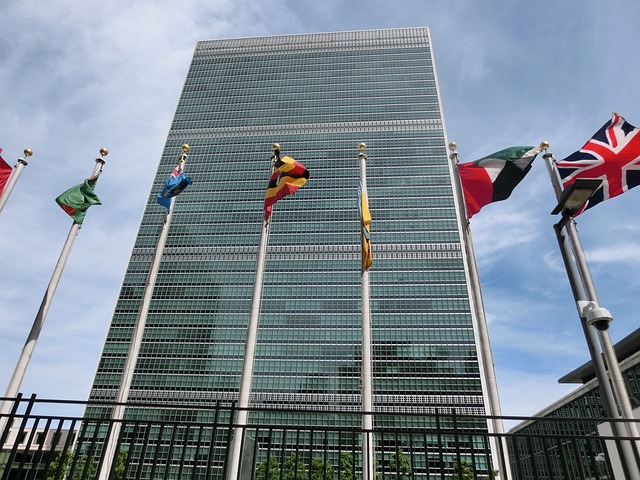China, the UN and the rules-based global order

Later today US Secretary of State Rex Tillerson will preside over a ministerial-level meeting of the UN Security Council on North Korea. Most observers will closely focus on Tillerson’s remarks, yet there’s no doubt that China—Pyongyang’s ally—has a pivotal role in diffusing tensions.
Amid the US sabre-rattling with its allies in the region and calls for renewed dialogue, China has been seeking to ensure a solution to the escalating tension remains within the purview of the UN. This is by no means surprising on China’s part—it’d prefer a resolution of the situation that halts North Korea’s nuclear program but maintains the regime in Pyongyang.
Beijing also wants a solution that results in the US reducing its military engagement in the region. Enhanced sanctions are more likely to deliver these outcomes than military action. Although the US leads on North Korea in the Council, it works bilaterally with China before sharing any draft resolution with the wider Council membership. So China’s strategic interests are best served by ensuring that the Security Council continues to manage the crisis on the peninsula. And it has an interest in undertaking a constructive role in any negotiations taking place.
‘China’ and ‘constructive’ are two words not usually seen together in a UN context. Beijing’s actions in the South China Sea, along with its voting pattern of siding with Russia to veto international efforts aimed at resolving the conflict in Syria, lend weight to China’s obstructionist profile when it comes to the UN or upholding the rules-based global order.
China refrains from taking on any ‘pen-holder’ responsibilities on the Council, relying on the P3 (the US, UK and France) to do the heavy lifting when it comes to drafting resolutions, mandates and Council responses. It has also frequently sided with Russia on issues that are likely to interfere with state sovereignty. Both countries unsuccessfully tried to obstruct efforts to put the human rights situation in North Korea on the Council’s agenda. When it was an elected member in 2014, Australia creatively drew on the Council’s own rules to use a procedural motion—which can’t be vetoed— to add the item to the Council’s agenda.
Still it’s worth noting that China’s position hasn’t always aligned with Russia’s on the Council. It took a noticeably different stance when it came to recent US missile strikes in Syria. Unexpectedly it didn’t rail against the interference in national sovereignty. Nor did it join Russia in vetoing recent attempts to adopt a resolution condemning the recent chemical weapons attack in Syria. While it’s difficult to identify the rationale, it’s fair to surmise that China’s engagement with the UN continues to evolve. One obvious aspect of this shift is in the area of UN peacekeeping, where it has growing interests.
China’s currently the largest troop and police contributor among the P5, with over 2,500 personnel deployed on 10 peacekeeping missions. While that number has dropped from a historic high of over 3,000 during 2015, China still ranks 12th on the list of countries contributing military and police personnel. President Xi also pledged 8,000 standby troops to the UN at a summit hosted by then President Obama in September 2015. China surpassed Japan in 2016 to become the second largest assessed financial contributor to the UN peacekeeping budget, currently paying 10.29% of the US$7.87 billion funding.
Like most countries, China’s engagement in UN peacekeeping isn’t purely altruistic. Most of its personnel are deployed on the African continent, where there’s significant overlap with China’s strategic interests. It has investments in the oil fields in South Sudan, where it has its largest deployment of personnel to any UN mission.
China’s in a unique position of influence: it has a permanent voice at the table that mandates and authorises operations, it has authority in budgetary negotiations about peacekeeping in the UN General Assembly’s Fifth Committee, and it has legitimacy within the community of major troop and police contributors, which often claims to go unheard in the council. China has been rumoured to be interested in the key post of head of UN peacekeeping, a position that the French have held for over 20 years, leveraging influence over the direction of UN peacekeeping policy.
Secretary-General Antonio Guterres will find it increasingly difficult to ignore China’s desire to have more influence in the UN system. Beijing has the political, financial and operational credentials to add weight to its position within the organisation’s peace and security architecture. And that may increase if the US, UK and France succumb to political pressure to focus on their own domestic concerns.
The Security Council discussions later today will show that North Korea is an issue where the UN can serve China’s interests, as well as those of the international community. As the world’s second largest economic and military spending power, China doesn’t need to rely on the UN to pursue its national interests. The North Korean issue serves as a reminder that it has many diverse reasons to constructively engage.